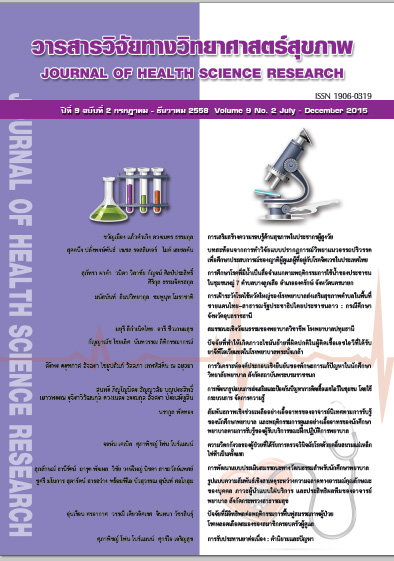รูปแบบความสัมพันธ์เชิงสาเหตุระหว่างความฉลาดทางอารมณ์ คุณลักษณะของบุคคล วะผู้นำแบบใฝ่บริการ และประสิทธิผลทีมของอาจารย์พยาบาล สังกัดกระทรวงสาธารณสุข
Main Article Content
บทคัดย่อ
วัตถุประสงค์ของการวิจัยครั้งนี้เพื่อตรวจสอบรูปแบบความสัมพันธ์เชิงสาเหตุระหว่างความฉลาดทางอารมณ์ คุณลักษณะของบุคคล ภาวะผู้นำแบบใฝ่บริการ และประสิทธิผลทีมของอาจารย์พยาบาล สังกัดกระทรวงสาธารณสุขกับข้อมูลเชิงประจักษ์ วิธีการวิจัยกลุ่มตัวอย่างได้แก่ อาจารย์พยาบาลสังกัดกระทรวงสาธารณสุขจำนวน 325 คนได้จากการสุ่มอย่างง่าย เครื่องมือที่ใช้ในการวิจัย เป็นแบบสอบถามแบบมาตราส่วนประมาณค่า 5 ระดับ โดยมีค่า IOC อยู่ระหว่าง .60 - 1.00 และค่าความเชื่อมั่นอยู่ระหว่าง .93 - .98 สถิติที่ใช้ในการวิจัย ได้แก่ค่าร้อยละ ค่าความถี่และการวิเคราะห์สมการโครงสร้าง
ผลการวิจัยพบว่ารูปแบบความสัมพันธ์เชิงสาเหตุระหว่างความฉลาดทางอารมณ์ คุณลักษณะของบุคคล ภาวะผู้นำแบบใฝ่บริการ และประสิทธิผลทีมของอาจารย์พยาบาล สังกัดกระทรวงสาธารณสุขมีความสอดคล้องกับข้อมูลเชิงประจักษ์ (χ2= 139.87, df = 109, p-value = .07, GFI = .96, AGFI = .93, CFI= 1, RMSEA = .03) โดยประสิทธิผลทีมของอาจารย์พยาบาล สังกัดกระทรวงสาธารณสุขได้รับ
อิทธิพลรวมสูงสุดจากภาวะผู้นำแบบใฝ่บริการ (.61) รองลงมา คือ ความฉลาดทางอารมณ์ (.29) และคุณลักษณะของบุคคล (.28)
สรุปผลการวิจัยรูปแบบความสัมพันธ์เชิงสาเหตุระหว่างความฉลาดทางอารมณ์ คุณลักษณะของบุคคล ภาวะผู้นำแบบใฝ่บริการ และประสิทธิผลทีมของอาจารย์พยาบาล สังกัดกระทรวงสาธารณสุข มีความสอดคล้องกับข้อมูลเชิงประจักษ์ และฉลาดทางอารมณ์ คุณลักษณะของบุคคล และภาวะผู้นำแบบใฝ่บริการสามารถอธิบายความแปรปรวนของประสิทธิผลทีมของอาจารย์พยาบาล สังกัดกระทรวงสาธารณสุขได้ร้อยละ 37
Abstract
Introduction: The purpose of research was to examine the congruence ofthe causal relationship model of emotionalintelligence, individual characteristics, servant leadership, and team effectiveness for nursing instructors under the Ministry of Public Healthwith the empirical data. Methods: Samples were 325 nursing instructors in the Ministry of Public Health selected by simple sampling. Research instruments used the questionnaire with five levels rating scale. The IOC was between .60 to 1.00 and confidence was between .93 to .98. Data were analyzed by using frequency, percentage, and Structural Equation Model (SEM).
Results: Themodel affecting the team effectiveness is in accordance with empirical data (χ2= 139.87, df = 109, p-value = .07, GFI = .96, AGFI = .93, CFI = 1.00, RMSEA = .03). Team effectiveness for nursing instructors in the Ministry of Public Health was based on servant leadership (.61), emotional intelligence (.29), and individual characteristics (.28). Conclusion: A causal relationship model of emotional intelligence, individual characteristics, servant leadership, and team effectiveness for nursing instructors under the Ministry of Public Health was consistent with empirical data. Emotional intelligence, individual characteristics, and servant leadership correspond to the variance of team effectiveness for nursing instructors in the Ministry of Public Health at 37 percent.
Downloads
Article Details
บทความที่ได้รับการตีพิมพ์เป็นลิขสิทธิ์ของวิทยาลัยพยาบาลบรมราชชนนี จังหวัดนนทบุรี
ข้อความที่ปรากฏในบทความแต่ละเรื่องในวารสารวิชาการเล่มนี้เป็นความคิดเห็นส่วนตัวของผู้เขียนแต่ละท่านไม่เกี่ยวข้องกับวิทยาลัยพยาบาลบรมราชชนนี จังหวัดนนทบุรี และคณาจารย์ท่านอื่น ในวิทยาลัยฯ แต่อย่างใด ความรับผิดชอบองค์ประกอบทั้งหมดของบทความแต่ละเรื่องเป็นของผู้เขียนแต่ละท่าน หากมีความผิดพลาดใด ๆ ผู้เขียนแต่ละท่านจะรับผิดชอบบทความของตนเองแต่ผู้เดียว


